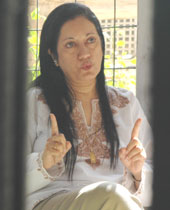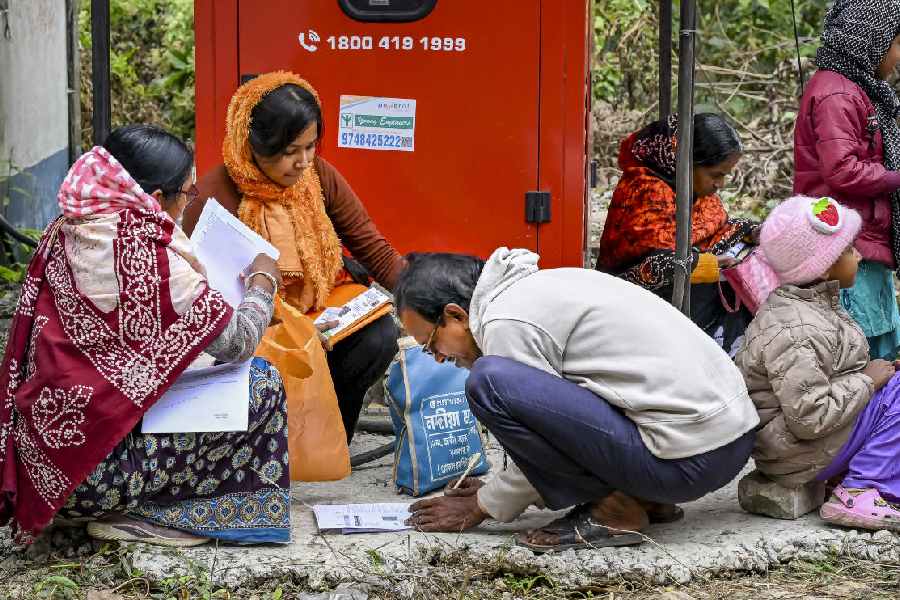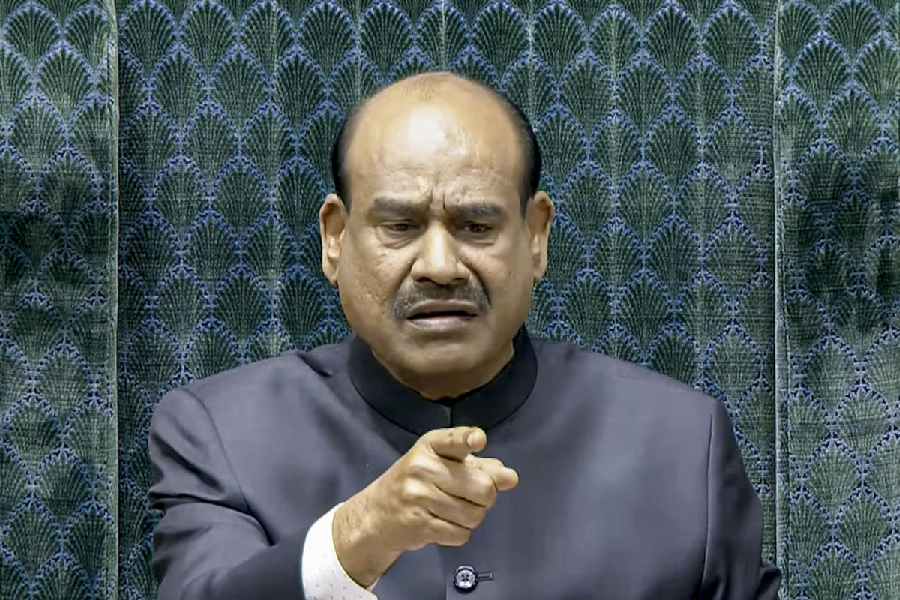 |
“I am often asked by people outside Pakistan if all our women go in burkhas,” says Rehana Hakim with a laugh. She may well find that funny. For, as long-time editor of Newsline, a leading Pakistani news magazine, it’s not just that she herself has always flown in the face of orthodoxy; she has also watched closely the evolution of Pakistani women, and the way, slowly but surely, they are pushing boundaries and decimating taboos.
In Calcutta last week to take part in a seminar on “Media, War and Conflict”, organised by the Network of Women in Media (NWMI), India, Bengal Chapter, Hakim, 58, was initially loath to give an interview. “Journalists should do interviews, rather than be interviewed,” she tells you, smiling. But later, she relents and you snatch some time with her in between NWMI sessions at the School of Women’s Studies in Jadavpur University.
Sitting on the sunlit verge of a dusty faculty building corridor, Hakim talks about her journalistic journey ? a remarkable 27-year roller-coaster ride through oppressive regimes, a straitjacketed media environment, glimmerings of glasnost and a few like-minded people’s unwavering determination to keep the freedom of the press alive. In fact, Newsline, the magazine she edits, was itself born in protest against General Zia-ul-Haq’s attempts to bring the media to heel.
In those days, Hakim used to work with The Herald, a magazine that’s part of the Dawn group of publications. There was so much pressure to toe the government line ? a pressure that the magazine’s bosses had also succumbed to ? that in 1989, Hakim and several other Herald journalists decided to walk out and start a magazine of their own. “Incredibly, it was mostly the women who walked out,” says Hakim. “The men felt they couldn’t take the risk because they really ‘needed’ their jobs ? as though we women didn’t ‘need’ to work for a living!”
Newsline was started as a journalists’ cooperative and remains so even today. “Everyone thought we wouldn’t even last three months. And we really had nothing those days. We pooled in our PF and gratuity, brought chairs, tables, typewriters, even coffee mugs, from our homes, and set up office. But it was all very exciting and exhilarating,” says Hakim.
Newsline went on to become one of the most widely read and respected English news magazines in Pakistan, winning a clutch of international and national awards for excellence in journalism. “We manage to annoy every government with our critical stories,” says Hakim, who took over as editor nine years ago. But she feels that although a military dictator is in power in Pakistan, the media is much less meddled with now than it used to be during General Zia’s time. “I won’t say that there are no pressures at all ? we often receive ‘advice’ from the government ? but on the whole, we are left to take our editorial decisions,” she says.
Another heartening development in present day Pakistan, feels Hakim, is the way its women are coming into their own. “There are so many more women in the public space today,” she says. Television, especially, is awash with women, she says. They dress fashionably, often in western attire, whereas earlier, there were a lot of taboos on women working in these fields.
Of course, the story of women’s freedom in Pakistan, as indeed in India too, is a story of contradictions. And Hakim is the first one to admit that: “On the one hand, you have high profile bankers, diplomats and mediapersons, and on the other, in the interior of the country, women are severely downtrodden. Again, despite so much of advancement, we still have retrogressive laws such as the Law of Evidence where the evidence of two women is considered to be equal to that of one man.”
And yet, even in a brutally suffocating environment a Mukhtaran Mai might emerge. Mai, who was gang-raped in 2002 to punish her brother’s alleged sexual misconduct in a bizarre manifestation of tribal justice, did the unthinkable and went on to fight for justice in the Pakistani courts.
“I am so proud of Mukhtaran,” says Hakim, her eyes lighting up. “What she has done is incredible. She’s truly a role model. And now she has opened a school in her village and, would you believe it, the children of her rapists are attending that school.”
Is she involved with the women’s movement in Pakistan, you ask her. “Not directly,” she replies. In fact, Hakim would rather not be labelled and docketed as a “feminist”. “I don’t like these labels,” she says with polite firmness. But as a journalist and an editor, she has always been sensitive to gender issues. So Newsline was the first to break the silence on sexual harassment in the workplace, women’s attitude towards sex and even run stories on gays and lesbians. “My activism is linked to my job as an editor. And I think the media can really play an important role in making people aware of their rights,” she says.
So how easy or difficult has it been for her as a woman to become a top dog in her field? “Not terribly difficult, I have to say,” she admits. Having had a liberal upbringing in Karachi ? she learnt dancing when she was young ? and armed with an MA in journalism from Karachi University, she had entered the world of media with some trepidation. But she didn’t encounter too many gender biases on the way. “The English media in Pakistan is actually quite women-friendly,” says Hakim. “It is the Urdu language media that needs to gender sensitise itself. A lot of work needs to be done there.”
Aside from her role as a spunky editor willing to take on the establishment in a just cause, one area where Hakim has been personally active is that of Indo-Pak relations. As a member of the South Asian Free Media Association (SAFMA), she has been part of its efforts to promote friendship and people-to-people contact between the two countries. “There is a lot of hope now and the atmosphere is much more relaxed than before,” Hakim says, pointing to the tremendous interest in Pakistan in all things Indian. “It’s not just Indian films, even TV serials like Kkusum are wildly popular. I myself don’t much care for the serials because I think they are a bit regressive, but there’s a huge outcry whenever they are taken off the air,” she says with a laugh. But as in all things Indo-Pak, the slightest hiccup could derail this d?tente, feels Hakim. “I hope that doesn’t happen,” she says.
For Hakim though, the friendship between the two countries is important not just for intellectual or idealistic reasons. For her, it is a matter of the heart as well. This, her first visit to Calcutta, is, in fact, a homecoming of sorts because her family used to live in the city at the time of the Partition. “My elder sister has memories of our house on Syed Amir Ali Avenue,” says Hakim.
Later the same day, you accompany her on a journey to her distant familial past. We locate the house on Syed Amir Ali Avenue ? a majestic four-storied building still left standing. Hakim looks at it in silence, her eyes brimming over. Behind us, trams trundle by. And at that moment, Rehana Hakim, Pakistani journalist and subcontinental citizen, feels more like a member of your own family than a woman you’ve just met that day.










